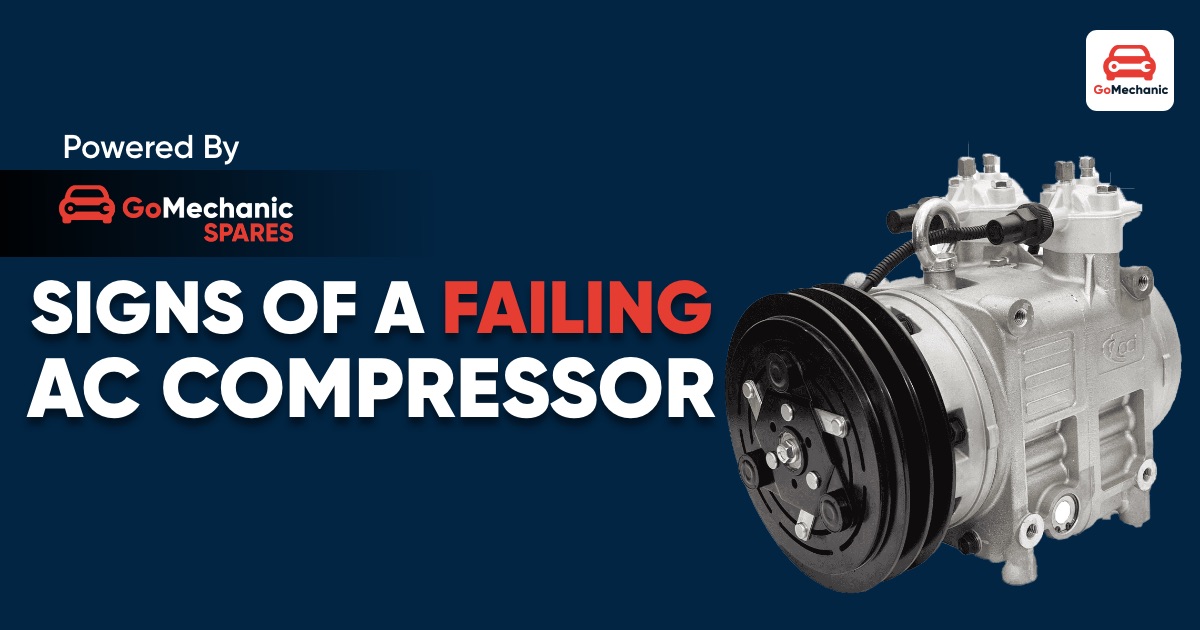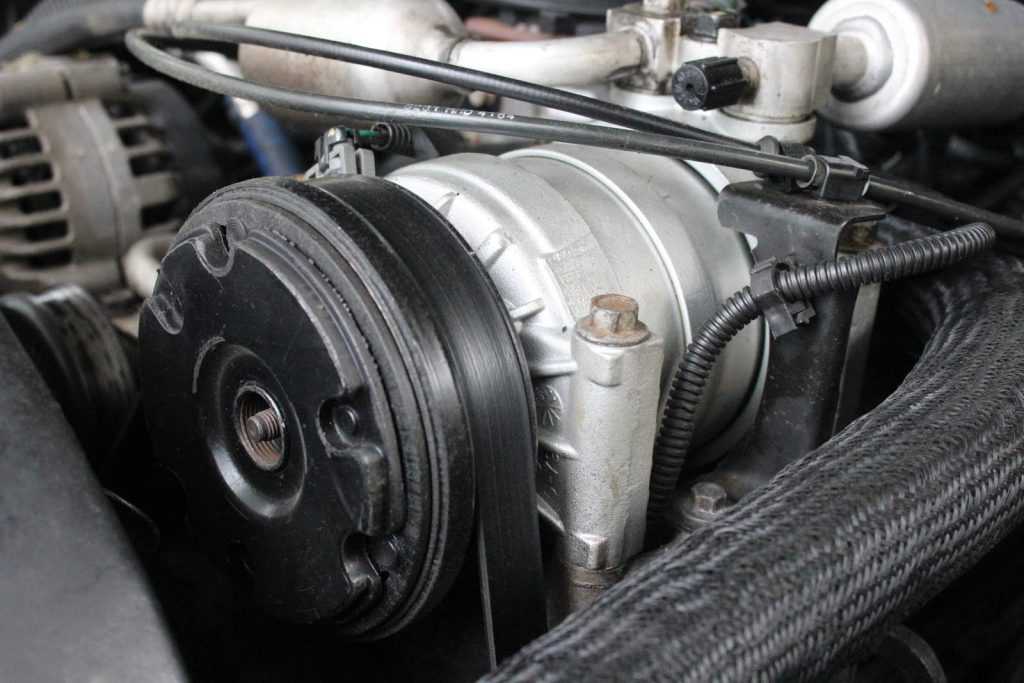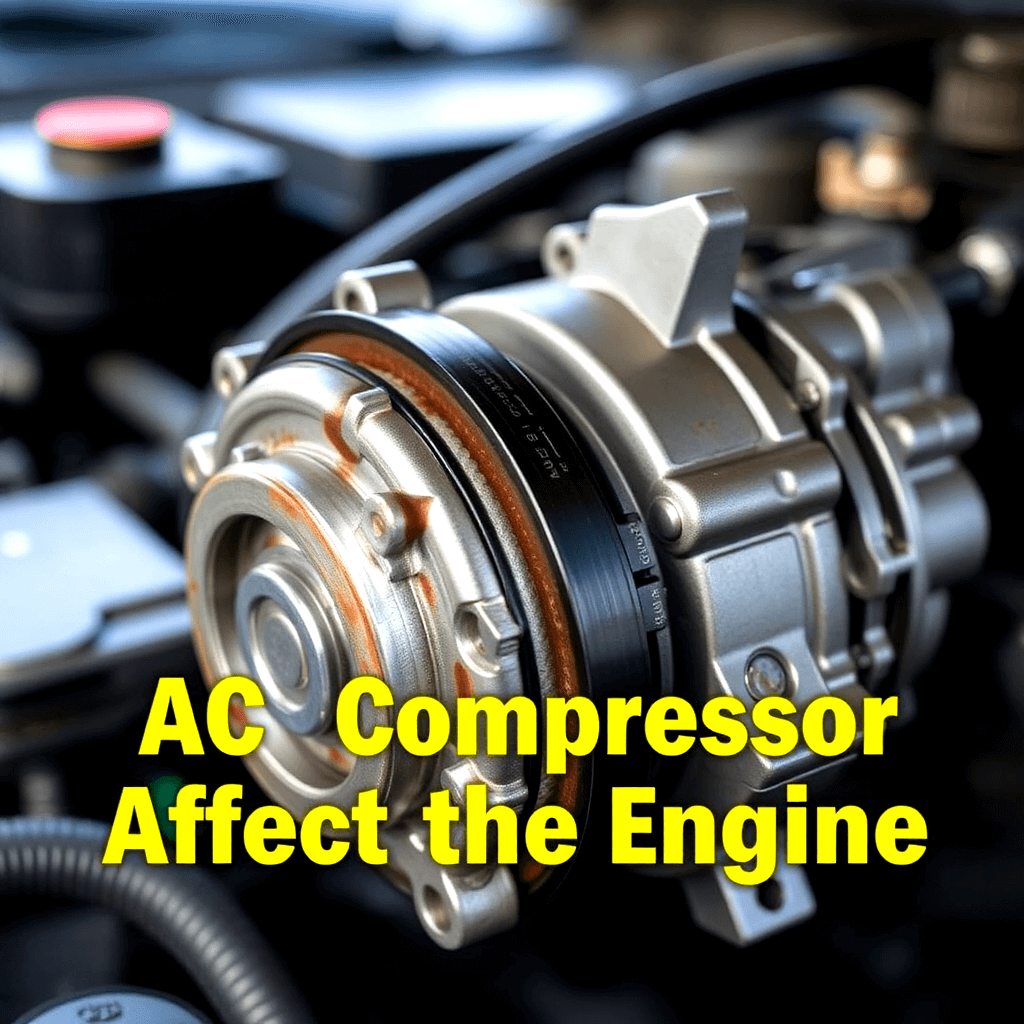When your car’s AC compressor starts to malfunction, it can have various negative impacts on your vehicle, including potential effects on the engine.
Impact on Engine Performance:
When it comes to our cars, we often overlook the air conditioning system until a scorching summer day reminds us of its importance. But did you know that a malfunctioning AC compressor could do more than just ruin your comfort? It can actually harm your engine.
In this blog post, we’ll explore how a bad AC compressor impacts engine performance, how you can check and maintain it yourself, when to seek professional help, and the potential long-term effects of ignoring the problem. By the end, you’ll have a comprehensive understanding of why keeping your AC compressor in top shape is crucial for your vehicle’s health.
The Role of the AC Compressor in Your Vehicle
The AC compressor is the heart of your car’s air conditioning system. It pumps refrigerant throughout the system, allowing you to enjoy a cool breeze on a hot day. However, its function doesn’t stop there. The AC compressor is also intricately connected to the engine, sharing the same serpentine belt that drives other critical components like the alternator and power steering pump.
When the AC compressor starts to fail, it can place undue stress on the engine. This is because the compressor requires power from the engine to operate. If it’s not functioning correctly, it can cause the engine to work harder than it should, leading to several potential issues. Understanding the role of the AC compressor can help you grasp why its health is vital for overall vehicle performance.
Essential Components of a Vehicle’s Air Conditioning System
Understanding your vehicle’s air conditioning system involves familiarizing yourself with its key components. Each part plays a crucial role in ensuring you stay cool and comfortable on the road.
1. Compressor
The compressor is the heart of the A/C system. It pumps refrigerant through the system and is vital for maintaining the flow of cool air. Without a functioning compressor, your entire system can falter, affecting engine performance and cooling efficiency.
2. Condenser
The condenser is essential for transforming refrigerant vapor into a liquid. Located at the front of the vehicle, it releases heat from the refrigerant, working in tandem with the radiator fans to dissipate heat effectively.
3. Evaporator
The evaporator cools the air that enters the vehicle’s cabin. Located inside the dashboard, this component absorbs heat and moisture from the air, ensuring a refreshing blast of coolness.
4. Expansion Valve or Orifice Tube
Acting as a regulator, this component controls the flow of refrigerant into the evaporator. Whether your vehicle uses an expansion valve or an orifice tube depends on the system design.
5. Receiver/Drier or Accumulator
These components serve as filters for the A/C system. A receiver/drier is paired with systems that use an expansion valve, while an accumulator is found in systems with an orifice tube. Both parts remove moisture and debris from the refrigerant, ensuring smooth operation.
By maintaining these components, you can ensure your vehicle’s air conditioning system operates efficiently and reliably, leading to a more comfortable driving experience. Proper knowledge and timely maintenance can help prevent common A/C issues and extend the lifespan of the entire system.
Signs of a Failing AC Compressor
Before we dive into how a bad AC compressor affects the engine, it’s essential to recognize the signs of a failing compressor. Early detection can save you from more significant problems down the road.
One of the most common signs is strange noises coming from the AC system. If you hear grinding, squealing, or rattling sounds when you turn on the AC, it could indicate a problem with the compressor. Another sign is reduced cooling efficiency. If your AC isn’t blowing cold air like it used to, the compressor might be struggling.
You may also notice refrigerant leaks under your car or around the compressor unit. This can happen when seals or gaskets wear out, causing refrigerant to escape. Finally, if your AC system frequently cycles on and off, it’s a sign that something is wrong. Understanding these symptoms can help you diagnose issues early and avoid more significant engine problems.
Impact on Engine Performance
Increased Fuel Consumption
A bad AC compressor can lead to increased fuel consumption. When the compressor is faulty, it can cause the serpentine belt to work harder, which in turn forces the engine to expend more energy. This extra effort translates to higher fuel usage. You might notice that your gas mileage has worsened without any apparent reason. Keeping an eye on your fuel economy can be an early indicator of compressor issues.
Overheating
Overheating is another significant risk. The shared serpentine belt means that a struggling AC compressor can affect the performance of other engine components. If the belt slips or breaks due to the added strain, it can lead to overheating. The engine needs proper cooling to function efficiently, and any hindrance can cause temperature spikes. Overheating can lead to severe engine damage, so it’s crucial to address compressor problems promptly.
Reduced Power
Lastly, a failing AC compressor can reduce the overall power of your vehicle. The engine has to work harder to compensate for the faulty component, which can lead to a noticeable drop in power and acceleration. You might find that your car doesn’t respond as quickly when you press the gas pedal. This can make driving less enjoyable and potentially unsafe, especially in situations where quick acceleration is necessary.
Symptoms of a Bad AC Compressor:
- Odd Noises
- Worn Out Serpentine Belt
- Warm Air Coming from Vents
- Leaking Refrigerant
If these symptoms are present, it is crucial to have your AC compressor checked by a professional mechanic.

Effects of a Bad AC Compressor:
When the AC compressor fails, the system may run continuously without cooling properly. This can result in less air coming out of the vents, potentially warm air, and higher power consumption.
A failing AC compressor can even cause the engine to resist or stall, particularly if the starting motor is not strong enough or failing.
Driving with a Bad AC Compressor:
While it may be tempting to continue driving your vehicle with a faulty AC compressor, it is not advisable. Driving with a bad compressor can put extra strain on the engine, leading to potential damage over time.
The longer you drive with a malfunctioning AC compressor, the more likely you are to cause extensive damage to both the engine and the AC system.
Can a Bad AC Compressor Prevent Start-Up?
If the AC compressor has failed in a way that causes the belt to lock up or come off, it can indeed prevent the car from starting. In such cases, replacing the compressor or bypassing it with an idler pulley may be necessary.

Is it Safe to Drive with a Broken AC Compressor?
Driving with a broken AC compressor is not recommended as it can lead to potential hazards and damage to the engine. The strain on the engine from a faulty compressor can cause accelerated wear and tear.
Remember, a well-maintained AC system not only ensures comfort but also contributes to the overall health and performance of your vehicle.
DIY Check and Maintenance
Inspecting the AC Compressor
For DIY enthusiasts, inspecting the AC compressor isn’t as daunting as it might seem. Start by locating the compressor—it’s usually found at the front of the engine, near the serpentine belt. Look for any visible signs of damage, such as cracks or leaks. Check the belt for wear and tear, and ensure it’s properly tensioned.
Checking for Refrigerant Leaks
Next, check for refrigerant leaks. Use a UV dye and a UV light to spot leaks around the compressor and other AC components. If you find any, it’s a clear sign that the compressor or its seals might be compromised. Make sure to wear gloves and goggles to protect yourself from refrigerant exposure.
Regular Maintenance Tips
To keep your AC compressor in good shape, perform regular maintenance. This includes checking the refrigerant levels and ensuring they are within the manufacturer’s recommended range. Also, run your AC system for a few minutes every week, even during the winter. This helps keep the compressor lubricated and prevents seals from drying out. Regular maintenance can extend the life of your compressor and keep your engine running smoothly.
How to Identify Issues with Your A/C Compressor
Ensuring your A/C compressor is functioning properly involves a series of straightforward checks. Here’s a step-by-step approach to diagnose potential issues:
- Visual Inspection
- Begin by examining the compressor itself. Look for obvious signs of wear and tear, such as rust or physical damage.
- Check the Clutch
- Observe the clutch mechanism. It should engage smoothly when the air conditioning is turned on. A malfunctioning clutch might indicate compressor issues.
- Inspect Belts and Hoses
- Ensure that all belts connected to the compressor are in good condition, without frays or cracks. It’s also essential to check hoses for secure connections and any visible damage.
- Monitor Temperature Consistency
- Pay attention to how effectively your A/C maintains cabin temperature. Inconsistencies can point to compressor problems.
- Detect Unusual Noises
- Listen for strange sounds, such as grinding or squealing, when the A/C is running. These noises can be early indicators of internal issues within the compressor.
- Check for Leaks
- Identify any refrigerant leaks, as they can decrease the efficiency of your air conditioning system. Leaks often present as oily spots around the compressor or connected components.
By systematically performing these checks, you can catch potential problems early and ensure your A/C compressor remains in optimal working condition.
Professional Diagnosis and Repair
When to Seek Help
While DIY checks are valuable, some issues require a professional touch. If you’ve noticed any of the signs mentioned earlier and aren’t confident in diagnosing the problem yourself, it’s time to visit a mechanic. Professional mechanics have the tools and expertise to pinpoint the exact issue and recommend the best course of action.
What to Expect During Diagnosis
During a professional diagnosis, the mechanic will conduct a thorough inspection of the AC system. This typically includes checking the compressor, refrigerant levels, and the condition of the serpentine belt. They may also use specialized equipment to detect leaks and assess the overall health of the system. Understanding what to expect can help you feel more confident when seeking professional help.
Common Repair Options
Common repair options for a failing AC compressor include replacing the compressor unit, fixing leaks, and replacing worn-out belts. In some cases, the entire AC system might need servicing to ensure optimal performance. Knowing the potential repair options can help you budget for the necessary fixes and avoid unexpected costs.
Long-term Effects and Cost of Ignoring the Issue
Potential Consequences
Ignoring a bad AC compressor can lead to several long-term consequences. Besides the immediate issues like increased fuel consumption and reduced power, prolonged neglect can cause more severe engine damage. The added strain on the serpentine belt and other components can lead to premature wear and tear, resulting in costly repairs.
Financial Impact
The financial impact of ignoring AC compressor problems can be significant. Minor issues can escalate into major repairs, such as replacing the entire AC system or even the engine. Regular maintenance and timely repairs can save you money in the long run by preventing more expensive fixes.
Emotional Stress
Aside from the financial burden, dealing with a malfunctioning vehicle can cause emotional stress. The uncertainty of potential breakdowns and the inconvenience of unexpected repairs can take a toll. By addressing AC compressor issues promptly, you can enjoy peace of mind and a reliable vehicle.
Conclusion:
It’s essential to address any issues with your car’s AC compressor promptly to prevent further damage to your engine and ensure the safety and efficiency of your vehicle.
Frequently Asked Questions On Will A Bad Ac Compressor Affect The Engine : Impact On Performance
Can I Still Drive My Car If The Ac Compressor Is Bad?
Driving with a bad AC compressor is possible but can strain the engine and lead to overheating. It’s best to get the compressor fixed to avoid damaging the engine.
What Happens When Ac Compressor Goes Bad?
A bad AC compressor can cause several issues. The airflow from the vents may decrease, and the air that does come out may be warm. The compressor failing can also cause the system to run continuously without cooling your home.
It can also result in higher power bills as refrigerant isn’t pumped through the system.
Will Bad Ac Compressor Cause Car To Shut Off?
A bad AC compressor can cause the engine to stall or shut off, especially if the starting motor is weak or failing. It is recommended to have the AC compressor checked and fixed to ensure the smooth operation of your vehicle.
Can A Bad Ac Compressor Cause Car To Not Start?
Yes, a bad AC compressor can cause a car not to start, if it fails in a way that causes the belt to lock up or come off. Otherwise, you can replace the AC compressor with an idler pulley or use a shorter belt to bypass the compressor.
Driving with a failing compressor may strain the engine.

